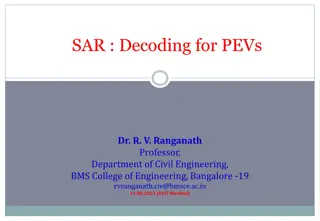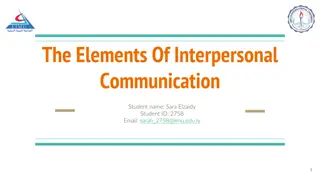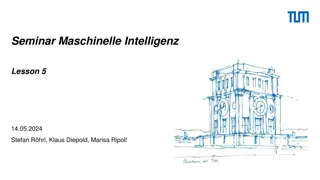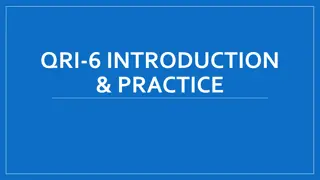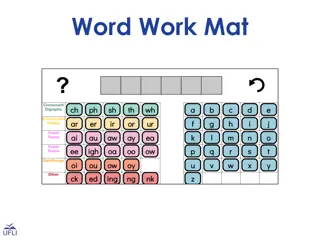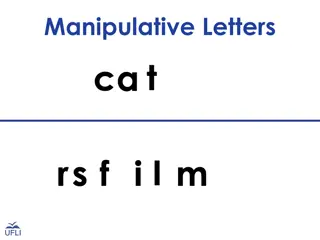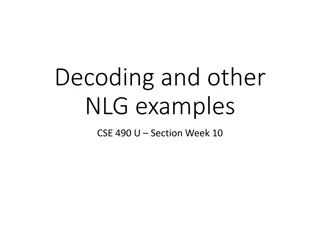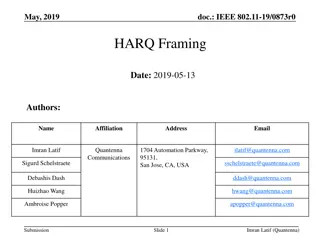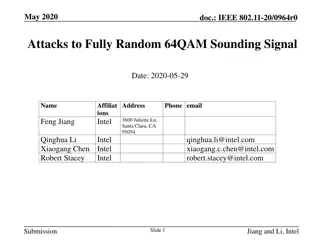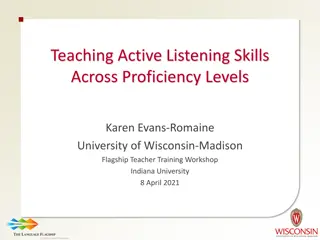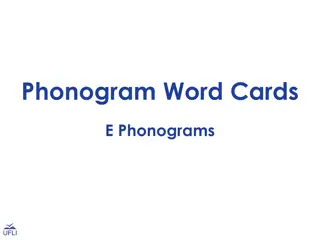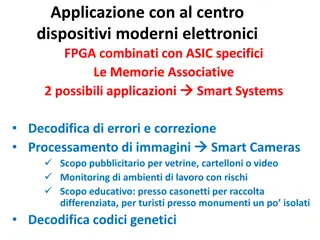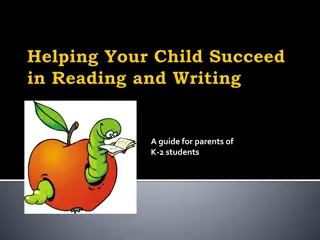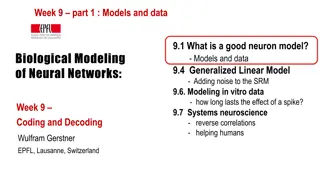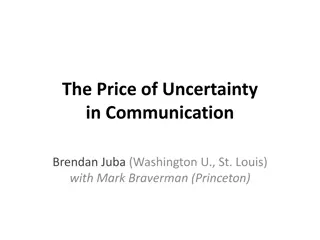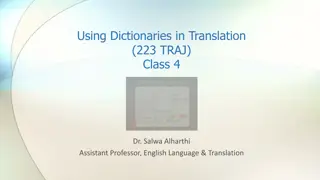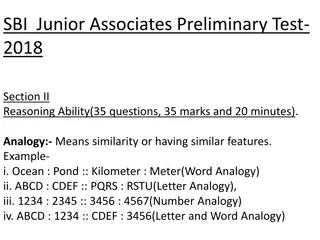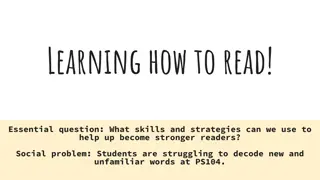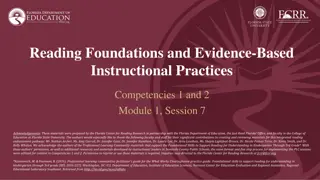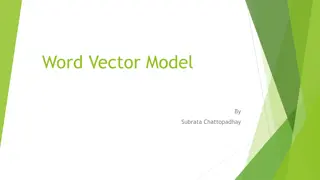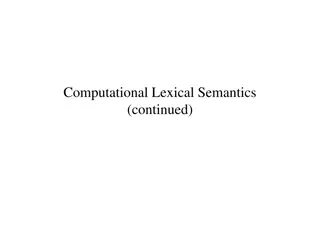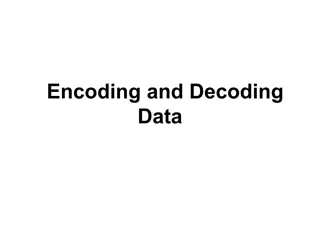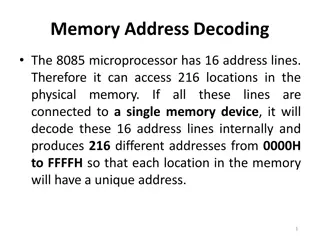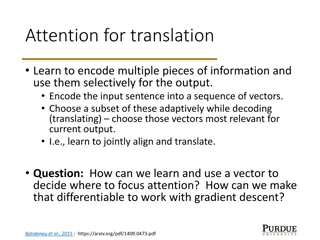SAR : Decoding for PEVs
This document provides detailed information on SAR decoding for Program Educational Videos (PEVs) at BMS College of Engineering in Bangalore. It covers key criteria such as institutional information, program-level details, faculty contributions, student performance, facilities, and continuous improv
0 views • 168 slides
SAR Decoding for PEVs by Dr. R. V. Ranganath at BMS College of Engineering, Bangalore
SAR Decoding for PEVs involves providing preparedness status for the NBA visit, presenting program status to the evaluation team, and documenting evidences to support the program assessment process. The SAR includes institutional and program level criteria, faculty information, facilities, continuou
0 views • 168 slides
Decoding SAR for PEVs by Dr. R. V. Ranganath - BMS College of Engineering
Decoding SAR (Self-Assessment Report) for PEVs (Program Evaluation Visits) provides a comprehensive overview of preparedness status, program criteria evaluation, and institutional information by Dr. R. V. Ranganath, a Professor at BMS College of Engineering in Bangalore. The report covers aspects su
7 views • 166 slides
Mastering Interpersonal Communication Skills for Success in the Workplace
Interpersonal communication involves the exchange of information, ideas, and feelings through verbal and non-verbal methods. Developing strong skills in encoding, decoding, feedback, and utilizing different communication mediums is crucial for effective communication. Good interpersonal skills enhan
0 views • 9 slides
Seminar on Machine Intelligence: Brain Decoding and Collaborative Discussions
The seminar on machine intelligence covered topics like brain decoding for visual perception reconstruction and collaborative group discussions. Participants engaged in analyzing research papers, understanding complex concepts, and exploring implications and limitations of the work. Activities inclu
0 views • 4 slides
Reading Assessment Guidelines for Students
Begin the reading assessment by starting with word lists below the student's grade level placement. Progress through word lists, evaluating accuracy and response time, to determine the student's reading level. Consideration should be given to decoding ability, recognition of patterns, and comprehens
0 views • 17 slides
Word Work Mat Activities for Beginner and Intermediate Levels
Engage students in interactive word building exercises using the online Word Work Mat in either Beginner or Intermediate mode. Encourage students to rearrange letter tiles to spell given words, fostering decoding skills. Access the resources through provided links or QR codes for an engaging learnin
0 views • 5 slides
Interactive Manipulative Letters Word Work Activity
Engage students in a fun and educational word work activity using manipulative letters. Prepare a list of words, guide students to rearrange and form new words by changing one letter at a time. Enhance decoding and encoding skills through interactive learning.
1 views • 4 slides
Decoding and NLG Examples in CSE 490U Section Week 10
This content delves into the concept of decoding in natural language generation (NLG) using RNN Encoder-Decoder models. It discusses decoding approaches such as greedy decoding, sampling from probability distributions, and beam search in RNNs. It also explores applications of decoding and machine tr
0 views • 28 slides
EEG Conformer: Convolutional Transformer for EEG Decoding and Visualization
This study introduces the EEG Conformer, a Convolutional Transformer model designed for EEG decoding and visualization. The research presents a cutting-edge approach in neural systems and rehabilitation engineering, offering advancements in EEG analysis techniques. By combining convolutional neural
1 views • 6 slides
Enhancing HARQ Framing for IEEE 802.11 Standards
Hybrid-ARQ (HARQ) is a candidate topic for TGbe presentations in IEEE 802.11 standards. Despite previous unsuccessful attempts, there is renewed interest in enabling HARQ through framing support. This document discusses the importance of presenting HARQ framing, outlining the necessary information a
1 views • 7 slides
Attacks on Fully Random 64QAM Sounding Signal in IEEE 802.11-20/0964r0
Presentation by Intel demonstrates vulnerabilities in fully random QPSK and 64QAM sounding signals in IEEE 802.11-20/0964r0. Proposed attack methods, including Viterbi equalizer attacks, and solutions such as Secure LTF mechanism and windowed FFT are discussed to enhance security in ranging. The pre
0 views • 31 slides
Enhancing Listening Skills in Language Teaching: Strategies and Challenges
Explore the challenges and strategies for improving listening skills across proficiency levels in language teaching. From decoding word borders to applying background knowledge, discover ways to enhance listening comprehension for learners. Gain insights into micro and macro skills that contribute t
1 views • 42 slides
Phonogram Word Cards for Teaching Phoneme-Grapheme Correspondences
Explore a collection of phonogram word cards featuring various phoneme-grapheme correspondences for educational activities like word sorts and review games. Enhance phonics skills with word lists containing words sharing the same phonogram, covering a wide range of graphemes and phonemes. Utilize th
0 views • 32 slides
Innovative Applications of Associative Memory in Modern Electronic Devices
Explore the diverse applications of combining FPGA with specific ASICs and associative memories in smart systems, error decoding, image processing, advertising displays, and workplace monitoring. Learn about Content Addressable Memory (CAM) utilization, pattern matching techniques, and real-life exa
0 views • 18 slides
Comprehensive Guide for K-2 Reading Intervention
This comprehensive guide for parents of K-2 students outlines effective reading intervention strategies to develop fluent and thoughtful readers. It covers essential elements like word recognition, comprehension, vocabulary, and offers practical activities to enhance word identification, decoding sk
0 views • 24 slides
Understanding Word Meaning in Lexical Semantics
Introduction to Chapter 5 Lecture 4.1 discusses the nature of word meaning, major problems of lexical semantics, and different approaches. It explains the concept of a word, prototypical words, lexical roots, lexemes, and word forms, highlighting the importance of the word as a lexeme in lexical sem
1 views • 20 slides
Decoding English Words: From Syllables to Morphemes
Explore the evolution of English language complexity due to historical invasions, the impact on orthography, and the significance of morphophonemic patterns in decoding, spelling, and understanding English words using Latin and Greek morphemes.
1 views • 22 slides
Decode Unfamiliar Words with Word Parts
English is a hybrid language with roots in Latin and Greek, making up over 75% of its words. By learning word parts, decoding unfamiliar words becomes easier. This lesson introduces word parts and provides examples to practice dissecting and understanding them.
0 views • 27 slides
Biological Modeling of Neuronal Networks: Insights from Neural Dynamics
Exploring neuron models, generalized linear models, and decoding processes in neural networks through intracellular and extracellular recordings, with a focus on processing models, encoding, and decoding of spike trains. The Spike Response Model and likelihood of spike trains are discussed, providin
0 views • 32 slides
Decoding Uncertainty in Communication: Exploring Prior Distributions and Coding Schemes
Delve into the intricate world of communication under uncertainty, where decoding messages accurately is paramount. Discover how prior distributions, encoding schemes, and closeness metrics influence the efficiency and effectiveness of communication between parties sharing different priors.
0 views • 22 slides
Understanding Word Formation and Coinage in English
Word formation in English involves different processes such as compounding, conversion, and derivational affixation. Compounding combines two or more words to create a new word, while conversion changes the word class without affixes. Word coinage includes compounds, acronyms, back-formations, abbre
0 views • 10 slides
Understanding the Role of Dictionaries in Translation
Dictionaries play a crucial role in translation by helping users find information about linguistic signs, word division, spelling, and word formation. The lemma serves as a representative of a lexical item in a dictionary, aiding users in locating specific entries. Word division information can assi
0 views • 12 slides
Predictability and Utilisation Trade-off in Video Stream Decoding Management
This study explores the trade-off between predictability and utilisation in managing multiple video stream decoding tasks on Network-on-Chip based embedded multi-cores. The objective is to make predictable admission control decisions while maintaining high system utilisation. Metrics include minimiz
0 views • 29 slides
Reasoning Ability Test - Analogy, Classification, Coding-Decoding Examples
Explore analogy, classification, and coding-decoding examples from the SBI Junior Associates Preliminary Test 2018 section on Reasoning Ability. Test your logical thinking skills with questions and answers related to similarities, grouping objects, and secret message patterns.
0 views • 10 slides
Strategies to Improve Word Decoding Skills in Struggling Readers at PS104
Students at PS104 are facing challenges in decoding new words, impacting their reading abilities. Common mistakes include guessing words, relying solely on pictures, and forgetting to track under each word. Strategies such as phonics programs and cueing systems are being explored to enhance reading
0 views • 15 slides
Supporting Children's Comprehension Skills in Year 6 Reading
Studies show that 1 in 10 children with adequate decoding skills struggle with comprehension, impacting motivation and academic performance. Parents can help by engaging in daily reading activities, visiting libraries, and asking questions. Year 6 assessments focus on decoding, understanding, infere
0 views • 17 slides
Foundational Practices for Effective Reading Instruction
These materials were prepared by the Florida Center for Reading Research in collaboration with the Florida Department of Education and faculty from Florida State University. This module emphasizes teaching students to decode words, analyze word parts, and improve word recognition skills. Recommendat
0 views • 21 slides
Understanding Text Similarity Techniques in NLP
Explore various text similarity techniques in Natural Language Processing (NLP), including word order, length, synonym, spelling, word importance, and word frequency considerations. Topics covered include bag-of-words representation, vector-based word similarities, TF-IDF weighting scheme, normalize
2 views • 62 slides
The Sunday of the Word of God Celebration - 24th January 2021
The Sunday of the Word of God, observed on the 24th of January 2021, is dedicated to the celebration, study, and dissemination of the Word of God. Pope Francis encourages Catholics worldwide to deepen their relationship with God through His Word. The event highlights the importance of valuing both t
0 views • 27 slides
Understanding Word Vector Models for Natural Language Processing
Word vector models play a crucial role in representing words as vectors in NLP tasks. Subrata Chattopadhyay's Word Vector Model introduces concepts like word representation, one-hot encoding, limitations, and Word2Vec models. It explains the shift from one-hot encoding to distributed representations
0 views • 25 slides
Understanding Word Sense Disambiguation in Computational Lexical Semantics
Word Sense Disambiguation (WSD) is a crucial task in Computational Lexical Semantics, aiming to determine the correct sense of a word in context from a fixed inventory of potential word senses. This process involves various techniques such as supervised machine learning, unsupervised methods, thesau
0 views • 67 slides
Decoding English: Understanding Word Origins and Meanings
Explore the fascinating world of English language roots and word parts derived from Latin and Greek. Learn how recognizing these components can help you decode unfamiliar words with ease. Dive into examples and practice dissecting words to enhance your vocabulary skills.
0 views • 9 slides
Exciting 2nd Grade Curriculum Overview for an Engaging School Year
Dive into the engaging world of 2nd-grade curriculum with a focus on Language Arts, Reading Workshop, Word Study, Writing Process, and Math. Explore the skills and activities planned for the school year, including decoding strategies, flexible reading groups, word patterns, writing types, and math c
0 views • 19 slides
Understanding Encoding and Decoding Data Principles
Data encoding involves converting information into a different form using specific rules, which is then decoded back to its original state. This process is crucial for secure communication, as seen in examples like Morse Code. Through encoding, messages can be kept confidential and accessed only by
0 views • 7 slides
Memory Address Decoding in 8085 Microprocessor
The 8085 microprocessor with 16 address lines can access 216 locations in physical memory. Utilizing a 74LS138 address decoder, chip select signals are generated for memory block selection. The interfacing involves decoding address lines to enable memory access, with distinctions between RAM and ROM
0 views • 18 slides
Combined Classification and Channel Basis Selection with L1-L2 Regularization for P300 Speller System
This study presents a method that combines classification and channel basis selection using L1-L2 regularization for the P300 Speller System. The approach involves EEG signal processing, feature extraction, P300 detection, and character decoding. The proposed method aims to improve decoding accuracy
0 views • 17 slides
Understanding Medical Terminology: Word Parts and Decoding
Essential knowledge of medical terminology involves understanding prefixes, suffixes, and root words. By dissecting word parts, health professionals can decipher complex terms and accurately interpret medical language. This guide highlights the role of root words, prefixes, suffixes, combining vowel
1 views • 24 slides
Insights into the Rowhammering.BIKE Cryptosystem and Decoding Strategies
Explore the Rowhammering.BIKE cryptosystem, its parameters, and the black-grey flip decoder. Learn about the bitflipping algorithm, prior analysis of DFR in QC-MDPC decoders, and strategies for key recovery and decoding in this innovative system. Discover how understanding the error patterns related
0 views • 7 slides
Understanding Attention Mechanism in Neural Machine Translation
In neural machine translation, attention mechanisms allow selective encoding of information and adaptive decoding for accurate output generation. By learning to align and translate, attention models encode input sequences into vectors, focusing on relevant parts during decoding. Utilizing soft atten
0 views • 17 slides


